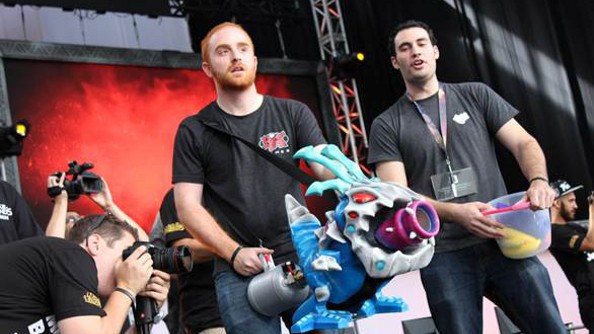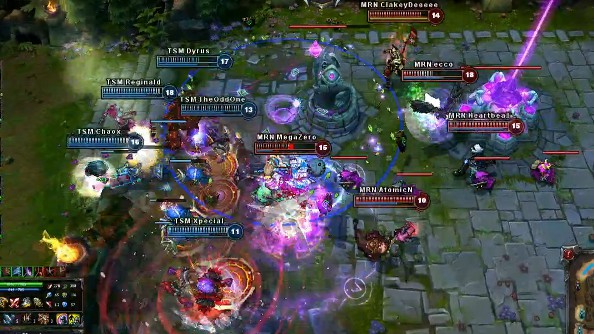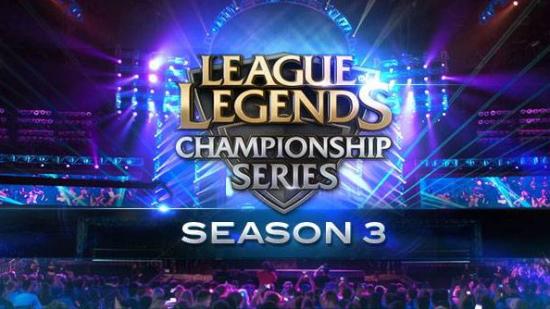We are three weeks into the League of Legends Championship Series’, a six month long League of Legends competition hosted, organized, and produced by Riot Games. While the LCS is still undergoing development as Riot’s production gets more sophisticated and adds new features, the scale of the endeavor and the control Riot exert over it are breathtaking. It’s unparalleled in PC gaming and eSports history: the developer of what is possibly the most widely-played PC game in the world is managing every aspect of the eSports they created. It requires massive investment in every stage of the process: high-end production, great casters, team salaries, and a multi-million dollar prize pool.
The result: and eSport that makes sense. If you’ve ever wanted a perfect entry point into the eSports scene, the League Championship series is it.
I spoke to Dustin Beck, Riot’s VP of eSports about the Championship Series, and what it means for the company and community, and some of the challenges the teams and players face.
Fundamentally, League is an eSport, says Dustin. “It’s competitive, it’s strategic, it’s team orientated and no two games are ever the same.” As the game grew, so did the tournament scene surrounding it. Riot hosted one of tournaments at PAX, and at GamesCom, but it was clear the community wanted something more. “We saw a huge groundswell of support, with fans wanting us to do more and more.
And so did Riot. eSports is in the company’s DNA. “It’s funny working at Riot. When I’m walking down the halls, everyone has two monitors, everyone has some sort of eSport on their screens.”
But eSports tournaments are hideously unapproachable to outsiders. Events take place across an entire weekend. Streams are rarely available 100% of the time, and are often of low quality. Matches overrun, and scheduling is a nightmare. It takes real dedication to tune in and understand what’s going on.
The format of the League Champion Series, Dustin says, is deliberately built to fix that: matches take place every Thursday and Friday in the US, and Saturday and Sunday in Europe. Each region includes a selection of eight teams; each plays twice each weekend. And, in an under appreciated masterstroke, the matches they play are not best of three: they are one offs. Suddenly, eSports sticks to a schedule.
“It becomes a lot easier to have the predictability of not having that game 3 that’s an unknown,” explains Dustin. You’re about to tune in at the right time, and watch the game, start to finish.
That amount of content is expensive. Making it look good is even more expensive. Riot have built a studio in Los Angeles that will host the US versions of the tournaments, bringing in outside talent (including executive producers who worked at the Olympics) to professionalise the broadcasts. They’ve committed to an HD stream. And they’re working on high-end promotional videos and pre-match content to bring out the storylines of the teams. And it’s working.
Of the sixteen teams playing, eight have been seeded into the competition as known quantities. Some are polished veterans with clear plans and goals and heavyweight sponsors. Others are ranked amateurs: an open bracket allowed the best players and teams in the world to compete for their spot. In a very real sense, the LCS is simply the highest rung on a competitive laddering system that every LoL player, casual or pro, can take part in.

When Dustin talks about the players, you can hear the excitement in his voice. “You have these Cinderella teams like Team MRN who barely made it into the online ranked qualifying tournament. They actually qualified with less than a half-hour left!”
All the players in the LCS are now professionals. Riot will pay each team $175,000 for their participation. The prize pool has even yet to be announced, but Dustin says will total around $5 million. But perhaps most importantly, Riot have created a platform where sponsors can get the most value out of supporting teams: sponsor know their logos will appear, and will appear week on week. “In reality,” says Dustin, “the sponsorship revenue, streaming revenue, and prize money is making up the lion’s share of their income. It’s getting pretty profitable to be an eSports player.”
It’s no exaggeration to say that for many of these players, League and the LCS have been life-changing events. It’s Riot’s job to bring those stories to viewers around the world.
“These teams are all-in with this,” says Dustin. “This is their career, their profession. Like, Ocelotte for example, he supports his family with League of Legends money.” He laughs as he talks about the promo shots they’re shooting. “We’re sending video teams to the NA teams, to their old houses, and following them as they move to LA to their new gaming houses. They’ve gotta say goodbye to their family, and their friends for the first time, and they’ve never been out of the state before. These types of storylines are so abundant, and we’re excited to bring those to life.”
Justice on Summoner’s Rift
Of course, Riot have brought other changes to the pro community.
“We think it’s a responsibility of the pro to act in a way that reinforces the Summoner’s Code,” Dustin says. “These guys are role models, whether they like it or not, for tens and hundreds of thousands of fans. Whether they like it or not, they have a responsibility to act higher than the bar than we hold our regular players to.”
The price of flouting Riot’s code of conduct can be severe, every bit as life-changing as the opportunity to compete as a pro. Before Season 3, Riot banned Dignitas’ jungler Christian “IWillDominate” Rivera from the LCS and banned his account. They issued additional bans and suspensions as the qualifiers concluded, tossing players out of the LCS just as their teams won a chance to compete.
“The timing has been unfortunate,” Dustin admits. “The reasoning was that we didn’t know who a lot of these players were before they qualified for the tournament. Once they did our Player Behaviour team began investigating everyone who was going to be playing. That caused some of the unfortunate timing. Generally speaking with our pro players, we tend to monitor them separately than our other players. …Going forward we know who our 40 pros are in America and 40 pros in Europe and we’re going to be monitoring those people. Hopefully we won’t be seeing those extreme edge cases where they’re getting banned. Hopefully, we’ll see more incremental punishments, maybe seeing a few suspensions or a fine. Just like any traditional sport, right?”
Riot’s rising tide
Riot’s investment is working. The first three weeks of LCS have been fascinating to watch. First of all: it works, mostly. The matches are often well-contested, particularly among the European teams, and the results have been relatively unpredictable. When you remember that the LCS is still in its infancy, a beta period, if you will, the prospects for what the LCS will be like in just a few months are dazzling.
Nevertheless, they’re aware that the LCS have put them in a delicate position with regard to eSports and many of the leagues and organizers who comprise them. Dustin stresses that Riot are working with their partners at MLG, ESL, IPL, and elsewhere to make their events a meaningful part of the LCS calendar. LCS broadcasts will be suspended for major tournaments, and Riot will schedule LCS matches to be played at partner events before a live audience. They’re also making the tournament scene the home of the LCS Challenger Circuit, where hopefuls compete for the chance to join the Championship Circuit.

But more broadly, Riot also don’t like to see themselves as some 800-lb gorilla coming in to dominate eSports. For all that League of Legends and other games like StarCraft 2 and Dota 2 may be rivals, with combative fan communities, Dustin stresses that Riot intend their involvement in eSports to be positive for everyone.
“Frankly, we think our foray into eSports is raising the tides of the ocean so that every boat is going get leveled up by this. We’ve already seen some immediate returns with some bigger sponsors getting involved in eSports. Honestly, [when you compare] IPL 5 to IPL 4, they’re going bigger and better and I think they’re taking cues from things we’re doing. We expect eSports in general to level up with our investment.”
Whether that’s true may depend on how successfully other leagues and communities can follow RIot’s lead. There are a lot of great things about League of Legends and its competitive community, but the real revolution in Riot’s LCS is its accessibility.
